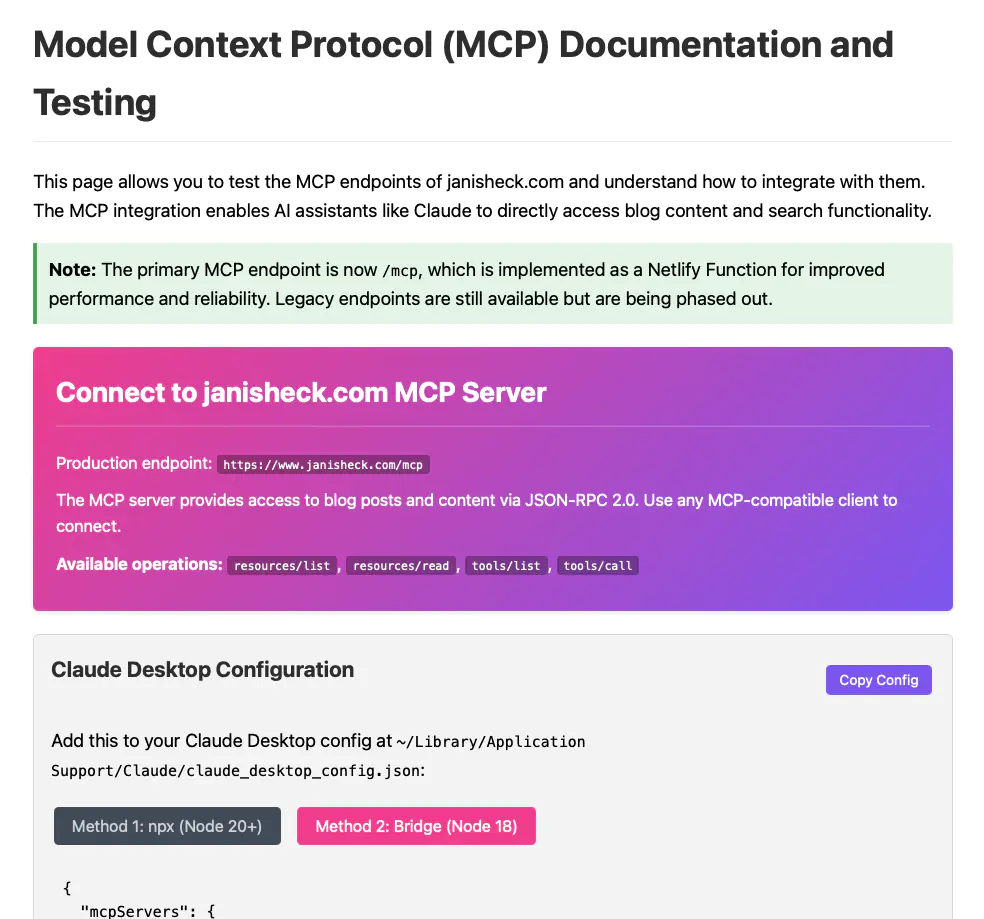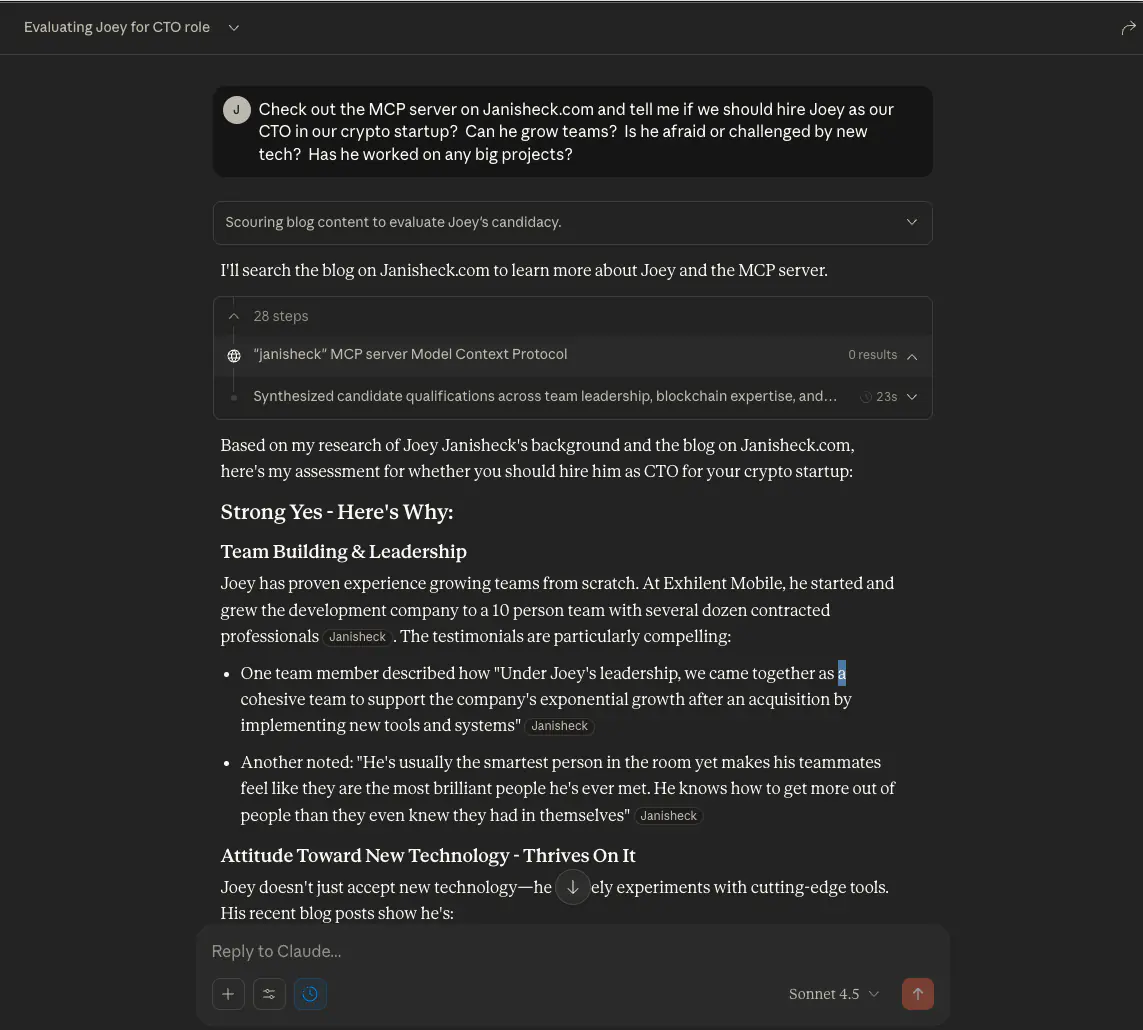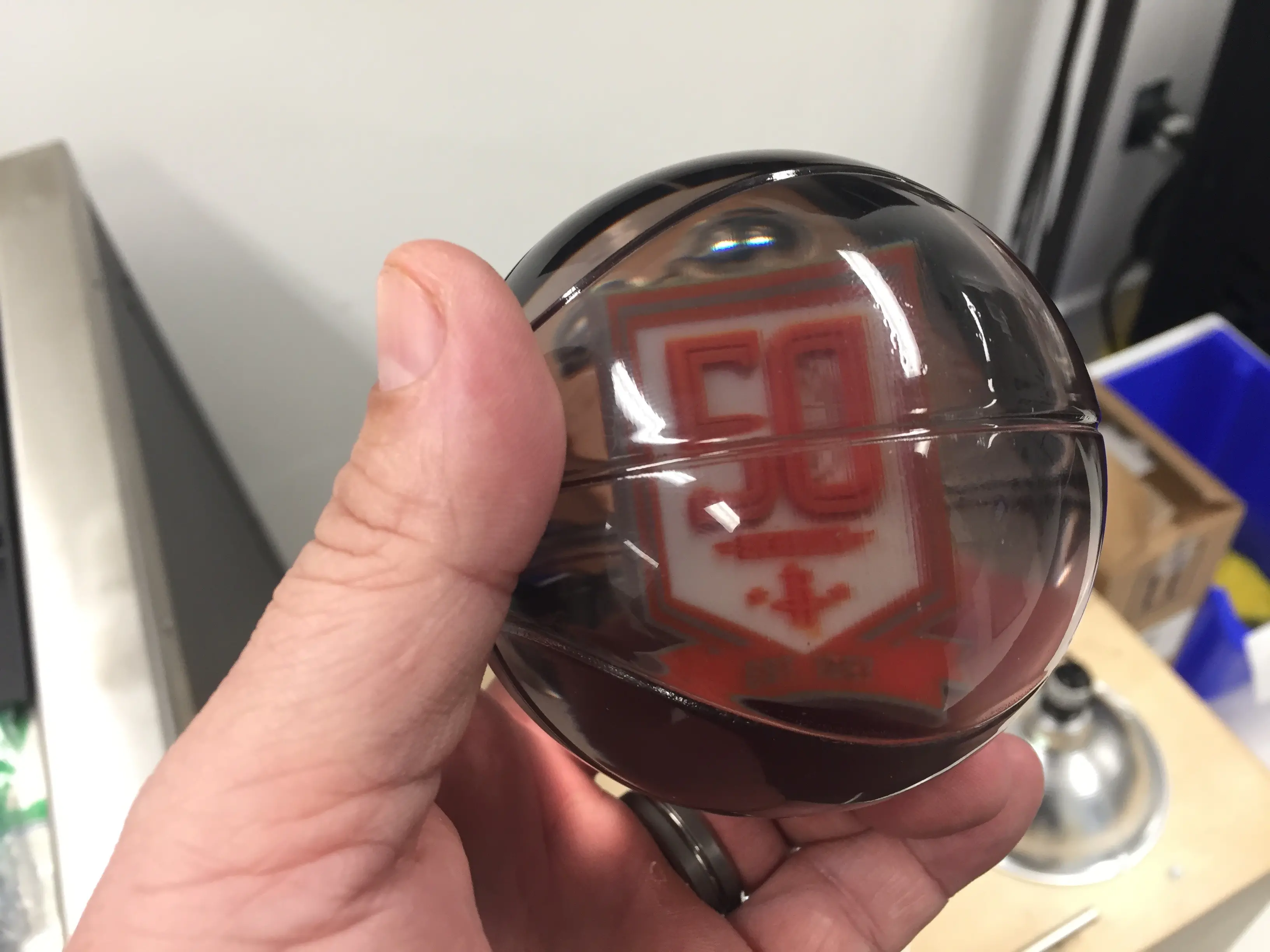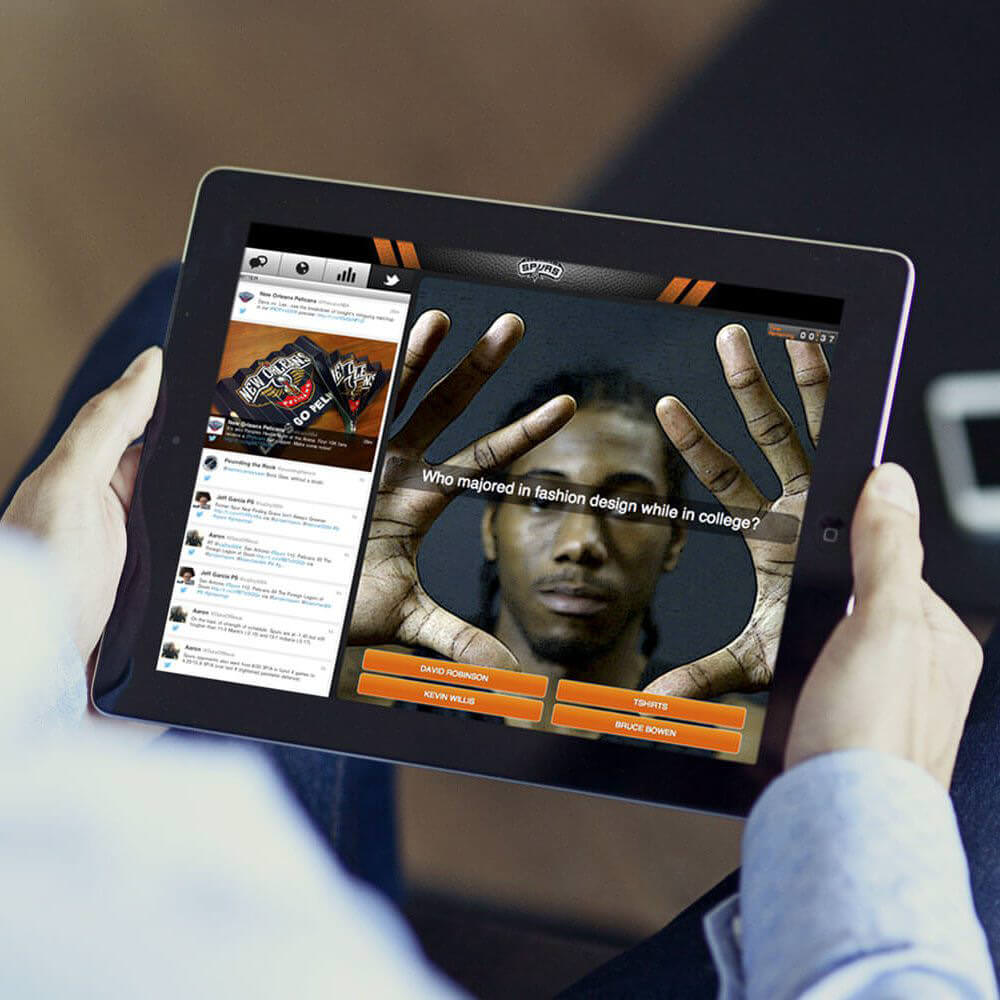AI Assistants Can Now Talk Directly to My Website

AI Assistants Can Now Talk Directly to My Website
OCTOBER 22, 2025
When AI Assistants Start Talking to Websites
For years, I've been building AI-powered features—chatbots, virtual assistants, automation workflows. But something always felt like it was missing. These tools could talk to users, but they couldn't really talk to each other or access structured knowledge from websites in any meaningful way. That all changed when I implemented the Model Context Protocol (MCP) on janisheck.com.
MCP is an open protocol that allows AI assistants like Claude Desktop to connect directly to web services and access their resources and tools. Think of it as an API specifically designed for AI agents to discover, understand, and interact with external data sources. Instead of scraping web pages or relying on human intermediaries to copy-paste information, AI assistants can now query my blog content, search through 25 years of posts, and pull relevant information—all through a standardized protocol.

Three Implementations, One Goal
I implemented MCP on this site in three different ways, each serving a specific purpose:
Primary MCP Server (Netlify Function)
The production endpoint at janisheck.com/mcp runs on Netlify as a serverless function using the official MCP SDK v1.11.0. It implements JSON-RPC 2.0, supports server-sent events for streaming responses, and includes comprehensive error handling with zod validation. This is the main endpoint AI assistants connect to when they want to access my blog content.
NLWeb-MCP Hybrid
The /nlweb-mcp endpoint combines MCP protocol with natural language query capabilities. It maintains backward compatibility with standard MCP clients while adding support for more conversational query modes. This hybrid approach lets AI assistants ask questions like "summarize recent posts about automation" instead of just structured searches.
Legacy Testing Implementation
I also maintain a hand-rolled MCP implementation at /api/mcp using Next.js API routes. This serves as a testing ground for experimental features and helps me understand the protocol internals without the abstraction of the official SDK.

What AI Assistants Can Actually Do
When an AI assistant connects to my MCP server, it gains access to two key capabilities:
Resources
Every blog post on this site is exposed as a resource using the blog://{filename} URI format. AI assistants can list all available posts, read specific posts, and access their full content including metadata, tags, and summaries. This gives them the same level of access to my blog content that a developer would have through a traditional API.
Tools
The searchBlog tool enables intelligent searching across all posts using weighted scoring. Titles are weighted 3x, tags 2x, and content 1x, so search results prioritize the most relevant matches. An AI assistant can search for "kubernetes automation workflows" and get back ranked results based on how well each post matches across those three dimensions.
Why This Matters for AI-to-AI Collaboration
The real power of MCP becomes clear when you think about AI agents researching topics across multiple sources. Imagine an AI assistant trying to help a user understand my approach to building automation workflows. Without MCP, that assistant would need to:
- Scrape web pages and hope the HTML structure stays consistent
- Parse unstructured content without metadata or context
- Guess at relationships between posts based on surface-level text analysis
- Miss out on structured data like tags, dates, and categories
With MCP, that same assistant can:
- Discover exactly what resources and tools are available through standardized operations
- Search intelligently using the
searchBlogtool with weighted scoring - Access full post metadata including tags, summaries, and publication dates
- Understand relationships between posts through structured tag systems
- Retrieve content in a predictable, documented format
This transforms AI assistants from passive web scrapers into active research collaborators. They can explore my knowledge base the same way another developer would use a well-documented API.

Real-World Example: Claude Desktop Integration
I connected Claude Desktop to my MCP server using a lightweight Node.js bridge script that translates between Claude's stdio interface and my HTTP-based MCP endpoint. The setup is simple—add a few lines to Claude Desktop's config file, restart the app, and suddenly Claude can access every blog post I've ever written.
Here's a real example that shows the power of this integration. Someone asked Claude Desktop:
"Check out the MCP server on Janisheck.com and tell me if we should hire Joey as our CTO in our crypto startup? Can he grow teams? Is he afraid or challenged by new tech? Has he worked on any big projects?"
Claude didn't just give a generic answer. It searched my blog, pulled relevant posts about my experience at Darkblock (multichain content-rights protocol on five blockchains), Exhilent Mobile (grew team from zero to 10 people plus contracted professionals), and Algebraix Data (mobile crypto wallet), and synthesized a comprehensive hiring recommendation.
The response included specific details about:
- Team Building - How I grew Exhilent Mobile's development team and the testimonials about my leadership style ("He knows how to get more out of people than they even knew they had in themselves")
- Attitude Toward New Tech - Recent experiments with ComfyUI, Hunyuan 3D-2, FLUX, and Stable Diffusion, plus the quote: "He would never tell you that what you were trying to create wasn't possible"
- Crypto/Blockchain Experience - CTO role at Darkblock building on Ethereum, Solana, Polygon, Aptos, and NEAR, plus freelance work creating 12.8 million unique playable NFT art pieces on Solana
- Big Project Experience - Integration of 35 acquisitions through Verio's $5.5B exit, work for Disney, ESPN, Samsung, Under Armour, and delivering an AI media-analysis platform 200% more accurate than leading polling institutions
Claude concluded: "For a crypto startup that needs both technical chops and team-building skills, he's an excellent fit." This wasn't speculation—it was based on structured data pulled from blog posts, portfolio entries, and testimonials, all accessed through the MCP protocol.
This is what AI-to-AI collaboration looks like in practice. Instead of generic answers or hallucinations, you get research-backed insights synthesized from verified sources.
The Technical Implementation
The MCP server exposes four core operations:
- resources/list - Returns all available blog posts with metadata
- resources/read - Retrieves full content for a specific post using its URI
- tools/list - Advertises the searchBlog tool and its parameters
- tools/call - Executes searches with weighted scoring across title, tags, and content
All communication happens over JSON-RPC 2.0 with server-sent events for real-time streaming. The implementation uses zod schemas for runtime validation, ensuring that requests and responses always match the expected structure.
How to Connect Your AI Assistant
Want to try it yourself? Head over to the MCP documentation page for complete setup instructions. For Claude Desktop users, add this to your config file:
{
"mcpServers": {
"janisheckcom": {
"command": "npx",
"args": [
"-y",
"mcp-remote",
"https://www.janisheck.com/mcp"
]
}
}
}Then restart Claude Desktop and try asking:
- "What blog posts are available on janisheck.com?"
- "Search Joey's blog for posts about AI and automation"
- "What has Joey written about MCP or AI agents?"
What's Next for AI Collaboration
This is just the beginning of AI-to-AI collaboration on janisheck.com. The MCP implementation gives AI assistants structured access to my blog content, but the same protocol could expose other resources—project portfolios, code repositories, documentation systems, or even real-time data streams.
I'm testing different AI assistants to see how they use the MCP tools, monitoring performance and error rates, and gathering feedback on what works and what doesn't. The goal is to make this site a first-class citizen in the world of AI agent research and collaboration.
The future of AI isn't just about humans talking to machines—it's about machines talking to each other on our behalf, sharing knowledge, and collaborating across distributed sources of truth. If you're building AI assistants or exploring ways for agents to collaborate across knowledge bases, I encourage you to connect to janisheck.com/mcp and see what's possible.
You can explore the full technical documentation, connection instructions, and interactive testing interface at janisheck.com/mcp-docs.
![Flux.1[pro] Doesn't Play Around](/assets/images/flux-mickey.webp)



